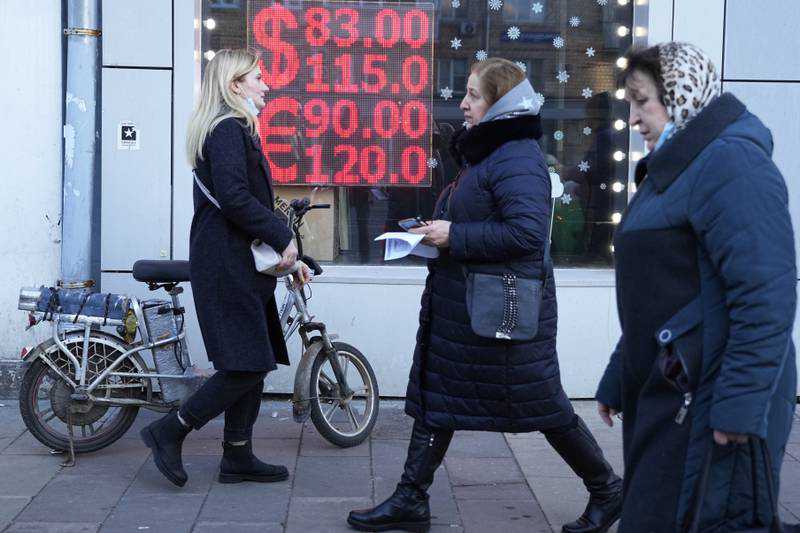Russian economy to lose almost 10% annually in the long term as western sanctions bite

The Russian economy has a lot more to lose in the long term than the US and its allies, whose crippling sanctions following Russia's military offensive in Ukraine have severely dented Moscow’s trade ties with the West, a report said on Thursday.
The decoupling of trade relations meant Russia's economic output would be almost 10 per cent lower annually in the long term, the Kiel Institute for the World Economy and the Austrian Institute of Economic Research said in a joint report. The allies, on the other hand, would suffer much smaller losses.
The projects were made using a simulation model that assessed how trade flows adjust in the long term when international supply chains are interrupted and how this affects the growth opportunities of an economy. It, however, does not model the short-term effects of reciprocal sanctions, which usually lead to income losses on both sides.
“Although the allies are also likely to be hit hard to some extent in the short term, in the longer term they would only have to fear an annual 0.17 per cent drop in economic output overall in the model-simulated case.”
Russia’s economy is reeling after the US and its allies imposed sanction on Moscow as it intensified attacks on Ukrainian cities. The punitive actions by the West aim to cripple Russian economy and freeze assets of oligarchs in President Vladimir Putin's inner circle.
European countries have closed their airspace to Russia's private and commercial jets and some Russian banks have also been barred from the Swift global financial network. The US Treasury has prohibited Americans from engaging in transactions with the Bank of Russia, the Russian Direct Investment Fund and the country's Ministry of Finance.
Russia’s central bank imposed capital controls on Monday and more than doubled interest rates to 20 per cent, their highest in nearly two decades, to support the currency. The Bank of Russia also restricted the transfer of coupon payments to foreign holders of rouble bonds and kept the Moscow stock exchange closed for a fourth day.
On Thursday, both Fitch Ratings and Moody’s Investors Service downgraded Russia's sovereign credit rating to “junk” status as the US and EU sanctions piled pressure on the economy. While the EU has barred Russia from accessing its capital markets, the cut in ratings will make it even difficult for Russia and Russian companies to raise funding globally.
The reason for Russia suffering a bigger economic fallout than the West is its heavy reliance on the US and its allies for trade. In 2020, the EU accounted for 37.3 per cent of Russia's foreign trade, but only 4.8 per cent of the EU's foreign trade was conducted with Russia.
If intra-European trade is also taken into account, Russia's share would be even lower. Import barriers imposed by the allies would hit Russia harder than export barriers, according to the Kiel Institute report.
“The simulation results give an impression of what is at stake for both sides in the long term: after a period of adjustment in world trade, Russia will be significantly weakened, while the damage for the allies is manageable,” said Gabriel Felbermayr, director at Austrian Institute of Economic Research.
The impact of the sanctions is also very unevenly distributed among the allies. Eastern European countries such as Lithuania would suffer a 2.5 per cent drop in output in the long term, Latvia 2 per cent and Estonia 1.1 per cent, said the report.
Germany and Austria, on the other hand, would see a 0.4 per cent and 0.3 per cent contraction of their gross domestic product, respectively. The US would only suffer a loss of 0.04 per cent, the report said.
Tags :
Previous Story
- Fitch and Moody's downgrade Russia to 'junk' as...
- Crypto will not save Russia from sanctions, experts...
- Moody’s places Russia and Ukraine ratings on review...
- Russia-Ukraine conflict raises big risks for global economy
- Grains surge amid supply concerns over Ukraine
- Oil jumps amid escalating tensions between Russia and...
- SpaceX launches 53 Starlink satellites into orbit
- Russian Energy Companies Halt Oil Supplies to Naftan...